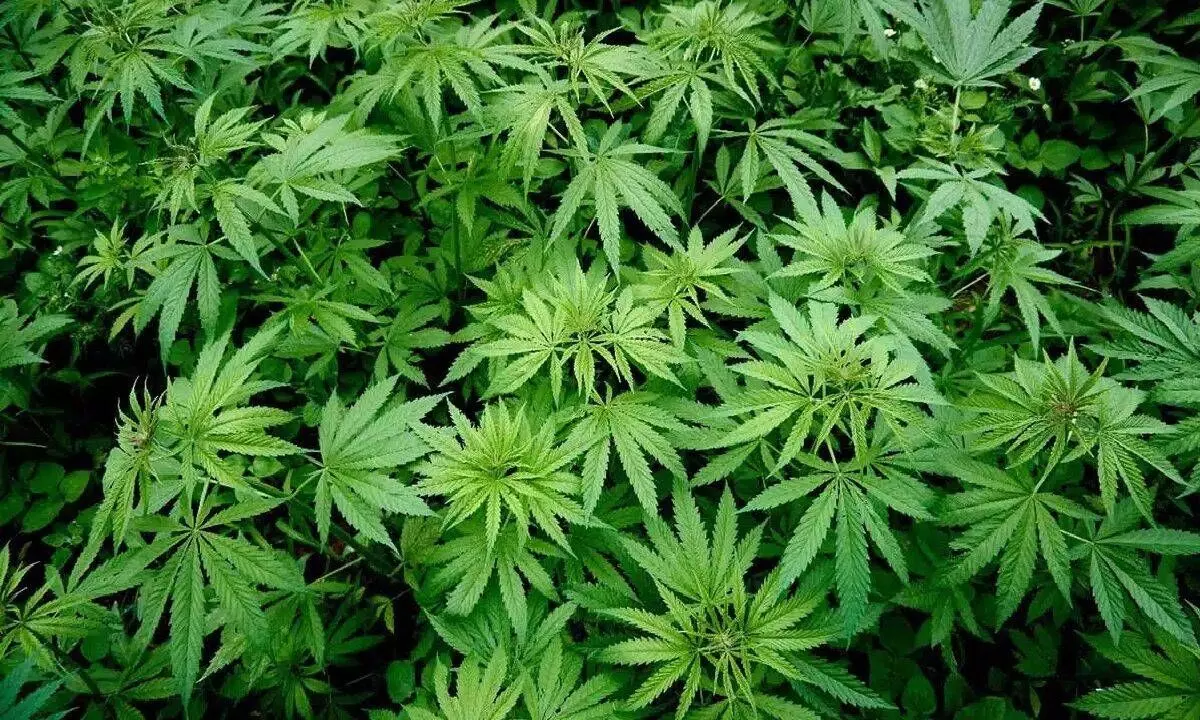Policy paralysis hitting hemp cultivation in TS
Hemp, which has multiple industrial uses, can be cultivated in semi-arid lands in Telangana
image for illustrative purpose

Hyderabad In 2018, there were eight startups in India that focused on industrial hemp. Currently, there are around 50. Hyderabad had two hemp startups, Hemp Republic and Hempsters. However, following a merger, the city now only has one hemp startup. These are the number of startups willing to take a risk on hemp, amid an emerging regulatory framework. The majority of these startups are involved in the more lucrative business of hemp CBD (Cannabidiol), which is registered under Ayush for its medicinal value. Very few startups are involved in hemp seeds, and a negligible number of them work with hemp fiber. Food Safety and Standards Authority of India has identified hemp seeds as a food source and sale of hemp fibre, and seeds are legal in India.
Despite being legal, industrial hemp startups face a major setback due to the high logistical costs involved in transporting hemp seeds, hurds, and fiber. This is because only Uttarakhand has regulations in place for growing hemp in India. However, Madhya Pradesh, Himachal Pradesh, and Uttar Pradesh are likely to have regulations in place for cultivating hemp by the end of this year. Madhya Pradesh has already released regulations for CBD and is in the final stages of formulating regulations for growing hemp. They have already invited interested parties to apply for licenses.
Hemp Republic founder Varun Gupta told Bizz Buzz that while Telangana has a law that allows for the operation of hemp stores, there are no regulations in place for growing hemp crops. This is also the case with Andhra Pradesh, Orissa, Karnataka, and Tamil Nadu. According to Gupta, if regulations are passed in Telangana, more startups will emerge in Hyderabad to experiment with hemp. He added that Hemp Republic and some other firms are working with the bureaucracy to help them understand why the State should put in place regulations for hemp farming.
Pre-Covid, Gupta had initiated talks with the bureaucrats and government of Telangana. He said, “They were ready to hear, but things were not moving as expected. One year back, we restarted the discussion. We have got a positive response from the Excise and Industries department. They are not saying no, but they are not saying yes either. Any work to proceed under government’s hierarchical structure takes time.”
The Government of Telangana is not denying the business opportunity that hemp cultivation presents. However, they are concerned about the potential for misuse of hemp leaves. Gupta has proposed that the government issue test licenses to valid companies instead of individuals, in order to mitigate these concerns.
He said: “We submitted our regulatory ideas, which were inspired by Uttarakhand but adapted to Telangana. The file is under consideration. There are multiple departments involved. For hemp seed, we need to involve the Food Safety and Standards Authority of India (FSSAI), the food processing department, the industries department for fiber, and then there is the excise department and the home department. After receiving feedback, we make changes to our recommendations and then take the file forward from there.”
Gupta has suggested installation of CCTV cameras, excise outpost, checking machines for the concerned government department to monitor misuse of hemp leaves. “We have given a set of regulations saying that these measures put in place will give the government strength. Tomorrow a Collector or SP can open a mobile app and see what is happening in the farm. We have also said that there are blockchain technologies in the West which can monitor hemp farms. We can do a tech transfer or ask T-Hub startups to develop a Web 3 platform,” the Founder added.
The sole hemp player in Hyderabad earns 70 per cent of its sales from export houses selling textiles and fibre to countries like Dubai. 30 per cent of its sale are earned in India from selling hemp seed hearts, powder, oil, textile and paper. Hyderabad, with the highest number of vegan cafes, also drives sale of hemp seeds.
Speaking about India as a market for hemp products, Gupta said, “A robust supply chain is need of the hour. If that happens, we can pass on the savings on logistic cost to the customers. We can reduce the selling price if we can bring down dependence on Uttarakhand. Now, startups cannot even imagine experimenting with hemp due to the high landing price. From hemp fibre alone, 30,000 products can be made. It is being utilised to its fullest in other countries, and hence, we have high export demand for hemp fibre.”
Hemp has the potential to be tomorrow’s sunrise industry. According to Gupta, hemp industry will bring new allied industries like hulling - retting machine, spinning machine, fibre processing, cold pressed machine for oil, among many others. Besides creating new jobs, Telangana government can earn from levying taxes as hemp comes under the State’s purview. Moreover, semi-arid lands in Telangana can be utilised for cultivating hemp crop, which needs minimal water, yet an acre of hemp crop yields four to five tonne of fibre and another tonne of seed which is four times the quantity of cotton.

